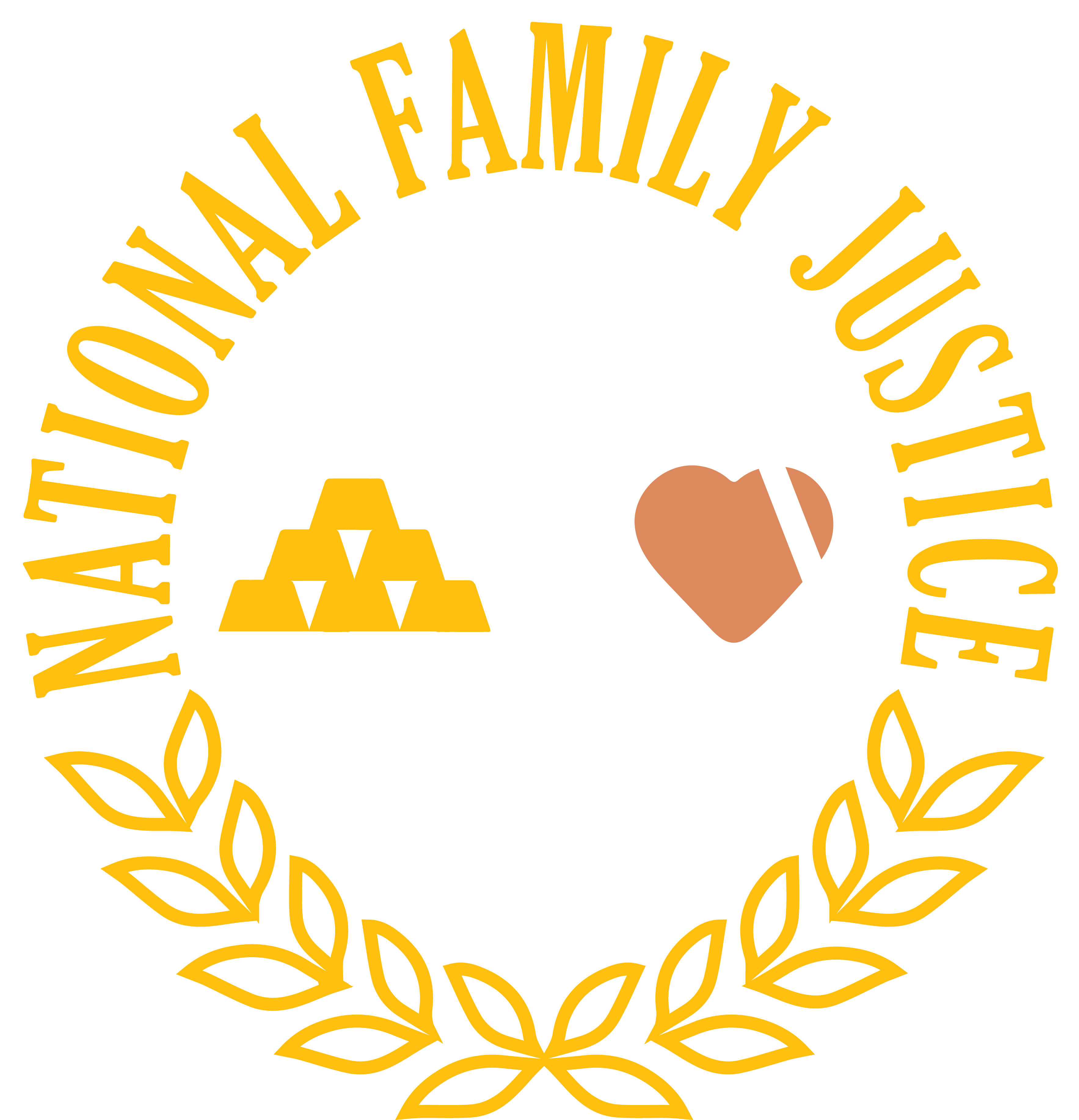National Family Justice
PROGRAMS
At National Family Justice we empower families navigating the legal system through advocacy, education, and reform. We stand for constitutional rights, child well-being, and family unity. Our services are rooted in science, law, and compassion.
WHAT WE DO
Our Programs
Parent Support Group Program
The Parent Support Group Program delivers trauma-informed education, peer support, and skills training to parents and primary caregivers entangled in high-conflict custody disputes or ongoing family court proceedings. Through weekly group sessions facilitated by NFJ-trained leaders, attorneys, and mental health professionals, the program helps caregivers maintain family stability, enhance parent-child relationships, and reduce both the emotional and financial harm usually caused by prolonged litigation.
Key Features
Weekly support groups facilitated by trained leaders and professionals
Trauma-informed education focusing on emotional regulation and parenting under stress
Skills development in child-centered communication
Court navigation guidance explaining key procedures and professional roles
Guidance for court document preparation
Resource coordination and referrals to community mental health services and attorneys
Who We Serve
Parents and primary caregivers nationwide experiencing:
High-conflict separation or divorce
Contentious custody disputes
Ongoing or repeated family court involvement
Outcomes
Enhanced family stability during proceedings
Stronger parent-child relationships
Reduced emotional trauma and litigation-related financial hardship
Greater understanding of the family court process
Stepparent Support Group Program

The Stepparent Support Group Program provides trauma-informed peer support, education, and community connection for stepparents navigating the unique challenges of blended family dynamics, co-parenting with former partners, legal and financial complexity, and identity development within their stepfamily roles. Stepparents frequently experience isolation, unclear boundaries, and limited recognition in family law and support systems. NFJ's Stepparent Support Group Program creates safe space for stepparents to connect, learn, and build skills while strengthening their contributions to family stability and child wellbeing.
Key Features
Weekly peer-led support groups in trauma-informed environments
Education on blended family dynamics and stepfamily development
Legal and financial literacy training specific to stepfamilies
Co-parenting communication and conflict resolution strategies
Resource coordination and referrals to family counseling and support services
Online and in-person group options for accessibility
Stepparent-specific content addressing identity, role clarity, and relationship building
What We Provide
NFJ facilitates weekly stepparent support groups led by trained peer leaders, mental health professionals, and facilitators with lived stepparent experience. Groups provide trauma-informed education on blended family development, co-parenting communication, boundary-setting, legal considerations affecting stepfamilies, and strategies for building healthy stepparent-stepchild relationships. In addition to peer support, the program offers one-on-one mentorship, resource coordination, and connections to community services addressing the specific needs of blended families.
Who We Serve
Stepparents who are:
Navigating blended family formation and adjustment
Co-parenting with former partners or ex-spouses
Experiencing conflict or tension in stepfamily relationships
Seeking clarity about their legal role and rights
Isolated or struggling with their identity within the stepfamily
Facing custody, visitation, or financial complexity related to blended families
Committed to supporting child wellbeing within stepfamily systems
Outcomes
Stepparents report increased sense of belonging and reduced isolation, improved communication and conflict resolution within blended families, greater clarity about role definition and expectations, stronger stepparent-stepchild relationships, and increased capacity to support overall family stability during separation or post-separation adjustment.
Shared Parenting Education and Planning Program
The Shared Parenting Education and Planning Program provides one-on-one coaching and collaborative planning services for couples and co-parents seeking to develop healthy shared parenting arrangements outside the adversarial family court system. This program is grounded in evidence-based principles that demonstrate shared parenting—when safe and appropriate—benefits children's emotional development, maintains both parent-child relationships, and reduces the trauma and financial costs associated with prolonged litigation.
Key Features
Evidence-based curriculum on child development and shared parenting benefits
Collaborative parenting plan development addressing custody, visitation, and decision-making
Co-parenting communication and conflict resolution skill-building
Documentation support for voluntary shared parenting agreements
Coordination with legal professionals to ensure plans are properly formalized
Ongoing support to help families implement and adjust plans as needs evolve
Who We Serve
Co-parents and couples who are:
Navigating blended family formation and adjustment
Co-parenting with former partners or ex-spouses
Experiencing conflict or tension in stepfamily relationships
Seeking clarity about their legal role and rights
Isolated or struggling with their identity within the stepfamily
Facing custody, visitation, or financial complexity related to blended families
Committed to supporting child wellbeing within stepfamily systems

What We Provide
NFJ offers personalized education and planning sessions with trained facilitators who help parents understand the psychological and developmental benefits of shared parenting arrangements. Through structured one-on-one consultations, parents work collaboratively to create comprehensive shared parenting plans that address custody, visitation, decision-making authority, communication protocols, and conflict resolution strategies. Our facilitators teach evidence-based co-parenting communication skills and help parents develop plans that prioritize their children's wellbeing while honoring both parents' roles.
Outcomes
Parents who participate in the Shared Parenting Education and Planning Program report increased cooperation, stronger parent-child relationships, reduced litigation costs and emotional trauma, and successful implementation of family-centered parenting plans that evolve with their children's needs.

Legal Education & Pro Se Support Program
The Legal Education & Pro Se Support Program equips parents and caregivers involved in family court with the comprehensive knowledge, procedural literacy, and practical tools needed to effectively self-advocate and navigate the legal system with confidence and competence. Through evidence-based educational workshops, webinars, and training modules (not legal representation), participants gain foundational understanding of family court processes, learn proven documentation and evidence-gathering techniques, understand their constitutional and statutory rights, and develop professional communication strategies that reduce conflict and promote more favorable case outcomes. Drawing on established family law education principles, the program prepares self-represented litigants to present their cases clearly, organize evidence effectively, and engage with the court system in ways that enhance their credibility and persuasiveness.
Key Features
Comprehensive curriculum on family court procedures, rules of evidence, and filing requirements
Training in strategic document organization, evidence collection, and exhibit preparation
Education on parental rights, custody statutes, and constitutional protections
Practical instruction in courtroom communication, professional demeanor, and persuasive presentation
Guidance on court rules of procedure and the roles of judicial officers, court personnel, and opposing parties
Regular workshops, community webinars, and self-paced learning modules for accessibility
Resources on how to respond to motions, cross-examination strategies, and courtroom best practices
Training on the difference between legal advice (which NFJ does not provide) and legal education (which empowers self-advocacy)
Who We Serve
Parents and caregivers engaged in family court proceedings or preparing for court involvement
Self-represented litigants seeking to increase their system literacy and procedural competence
Individuals unable to afford private legal representation who need guidance on navigating court processes independently
Those seeking to strengthen their case presentation and documentation
Outcomes
Significantly increased knowledge of family court procedures, rules, and strategic best practices
Greater confidence and competence in self-representation and courtroom presentation
Markedly improved documentation, evidence organization, and case file management
Enhanced professional communication and courtroom demeanor
Reduction in harmful, adversarial, or counterproductive litigation behaviors
Better-prepared litigants who present stronger cases and achieve more favorable outcomes
Increased system literacy that translates to more effective advocacy on behalf of children and families

Military & Veteran Family Support Program
This specialized program provides targeted support and resources for military-connected families experiencing divorce, custody disputes, or intimate partner violence-related legal issues. Drawing on community partners trained in trauma and reintegration stress, NFJ ensures that service members, veterans, and their families receive the tailored support needed for parent-child continuity and family stability.
Key Features
Specialized support for military and veteran families
Educate military and veteran families on federal protections like the Servicemembers Civil Relief Act (SCRA) and the Uniform Deployed Parents Custody and Visitation Act (UDPCVA) in custody matters.
Coordination with community partners trained in military family trauma
Guidance through unique military-related custody/legal issues
Access to behavioral health and family reintegration resources
Who We Serve
Active-duty service members, reservists, veterans, and their spouses experiencing family law issues
Military-connected families seeking support through family transition
Outcomes
Maintained parent-child relationships despite service/disruption
Reduced family fragmentation and conflict
Expanded access to behavioral and mental health support
Supervised Visitation Program
The Supervised Visitation Program provides trauma-informed, professional supervision of parent-child contact for families navigating high-conflict custody disputes or protective concerns. Recognizing that supervised visitation is often mandated based on allegations alone or used punitively, NFJ works to ensure this critical service does not create additional barriers to meaningful parent-child relationships or compound financial hardship for families already struggling with court-involved separation.
What We Provide
NFJ offers free or low-cost supervised visitation in select locations (currently Florida and Nebraska) conducted by trained supervisors who prioritize child safety while supporting healthy parental connection. Sessions are conducted

in safe, neutral environments designed to minimize trauma and preserve the bond between parent and child. Our supervisors maintain detailed documentation of all interactions to provide accurate, objective reporting to the family court.
Key Features
Professional, trauma-informed supervision conducted by NFJ personnel whose training surpasses the Supervised Visitation Network’s standards and requirements.
Safe, neutral visitation environments
Objective documentation and reporting to family courts
Flexible scheduling to accommodate work and family needs
Free or reduced-cost services to eliminate financial barriers
Collaboration with legal professionals, mental health providers, and court systems
Transition support to move families toward unsupervised contact when appropriate
Who We Serve
Parents and caregivers who are:
Court-ordered to participate in supervised visitation
Unable to afford private supervision services
Seeking to demonstrate safe parenting and rebuild trust with their children
Transitioning from protective custody arrangements
Navigating allegations or concerns that have impacted custody arrangements
Outcomes
Supervised visitation through NFJ helps families maintain critical parent-child bonds while addressing court concerns, supports parents in demonstrating parenting capacity, and creates pathways toward reduced supervision and restored family contact.

Civics and Legislative Advocacy Education Program
NFJ’s Civics and Legislative Advocacy Education Program delivers nonpartisan training for families, advocates, and professionals to understand public policy creation and practice effective legislative engagement. The program includes structured learning in civic engagement, legislative tracking, advocacy, and leadership development—all focused on empowering constructive participation in family justice reform.
Key Features
Workshops on state/federal government structures and legislative process
Training in communication with legislators and preparation of testimony
Development of policy briefs, fact sheets, and advocacy toolkits
Leadership development and grassroots coalition-building support
Nonpartisan, educational approach
Who We Serve
Families, community members, and professionals interested in policy and legislative advocacy
Grassroots family justice reformers
Outcomes
Increased civic literacy and engagement
More effective advocacy and testimony
Stronger grassroots leadership and collaboration
Community-wide understanding of nonpartisan participation
Metabolic Loop Foundation Program
Parents caught in custody disputes often neglect their own care, prioritizing legal battles and financial survival over basic nutrition and rest. Many discover—often too late—that poor gut health, chronic stress, and disordered eating patterns are silently undermining their mental clarity, emotional resilience, and physical stamina. The Metabolic Loop Foundation changes that by providing evidence-based, practical tools to reset metabolism, restore sleep, stabilize emotions, and reclaim the energy and focus you need to be fully present for your children.

The Metabolic Loop Foundation is a free, on-demand, self-paced program designed to help parents and caregivers navigating family court stress rebuild their physical and emotional health from the ground up. Developed by Dr. Kim Wiest of Living Well Solutions, this comprehensive course addresses the interconnected systems of nutrition, metabolism, stress, sleep, and emotional wellbeing—recognizing that when one system breaks down, it affects everything else.
Key Features
Setting Goals that Stick — Define meaningful, achievable wellness targets
Diet Mindset vs. Guiding Principles — Shift from restriction to sustainable, nourishing choices
Balanced Meals and Portion Sizes — Learn practical nutrition fundamentals
The Organized Kitchen — Create an environment that supports healthy eating
Metabolism, Energy, and Fat Burning — Understand how your body works and what it needs
Eating Mindfully, Honoring Hunger and Fullness — Reconnect with your body's signals
Cravings and Emotional Eating — Address the stress-eating cycle
Self-Sabotage Beliefs — Identify and release patterns that undermine your progress
Sleep, Stress, and Choosing Well — Prioritize rest as a non-negotiable foundation
Eating Out and Choosing Well — Navigate real-world situations with confidence
Movement — Integrate sustainable physical activity into daily life
Program Outcomes
By completing the Metabolic Loop Foundation, participants report:
Improved sleep quality and stress resilience
Stabilized energy levels and reduced brain fog
Reduced anxiety, depression, and emotional dysregulation
Better digestion and gut health
Clearer thinking and improved decision-making
Greater emotional capacity to navigate family court challenges
Renewed sense of control and agency over their health
Access
The Metabolic Loop Foundation is offered FREE to all NFJ parents, caregivers, and supporters as part of NFJ's commitment to whole-person healing and resilience.
Sign up here for the FREE Metabolic Loop Foundation: https://livingwell.functionalhealingmedicine.com/member-free-access-page
Important: After signing up, please check your email junk or spam folder to ensure you receive your confirmation and access instructions.
Frequently Asked Questions (FAQ)
Helping families understand their rights, options, and next steps
1. What does National Family Justice do?
We support families navigating high-conflict custody, family court, and legal system abuse. Our services include education, advocacy, professional training, and support for families facing issues like violations of rights, coercive control, domestic violence, and parental alienation. We also file amicus briefs in landmark cases affecting parental rights.
2. Are you a law firm?
No, we are not a law firm and do not provide legal representation or advice. However, we offer tools, education, document review, and strategic support to empower families and pro se litigants. We can also help you find trauma-informed legal professionals in your area.
3. Can you help me if I don’t have a lawyer?
Yes. We specialize in supporting pro se (self-represented) parents with tools and reasources to help you advocate for yourself in court. We also provide referrals to vetted professionals.
4. Can you help if my case involves domestic violence or coercive control?
Absolutely. We recognize the difference between true “high conflict” and post-separation abuse. We help parents identify patterns of coercive control, gather documentation, and protect their children while advocating for safety in court.
5. What is your stance on shared parenting?
We support 50/50 shared parenting as the default in the absence of abuse, supported by child development research and constitutional equal protection. We also advocate for safe exceptions when domestic violence, abuse, or coercive control is present.
6. What is an amicus brief and how do you use them?
An amicus brief (friend of the court brief) is a legal document we submit to offer expertise or insight in cases with broad impact. We use them to advocate for parental rights, equal custody, and protections for children in courts across the U.S.
7. Do you work with military families?
Yes. We assist military-connected families by ensuring custody orders respect deployment obligations, federal protections like the SCRA and UDPCVA, and parent-child bonding despite service duties.
8. Can you help with problems involving CPS, a guardian ad litem, or a parenting coordinator?
Yes. We review CPS reports, GAL conduct, parenting coordinator conduct, custody evaluations, and risk assessments for ethical violations. We also provide documentation support and can help elevate concerns when due process is denied.
9. How can I get involved with your organization?
You can support our mission by volunteering, donating, or joining our parent-to-parent mentorship program. We also welcome professionals who want to advocate for reform or provide trauma-informed services.
10. How do I request help or a case review?
Use our contact form or email us directly at [email protected]. Please provide a short summary of your situation and what kind of support you’re seeking. A team member will follow up within 3–5 business days.
Get Involved
Copyright © 2026 National Family Justice - All Rights Reserved.








